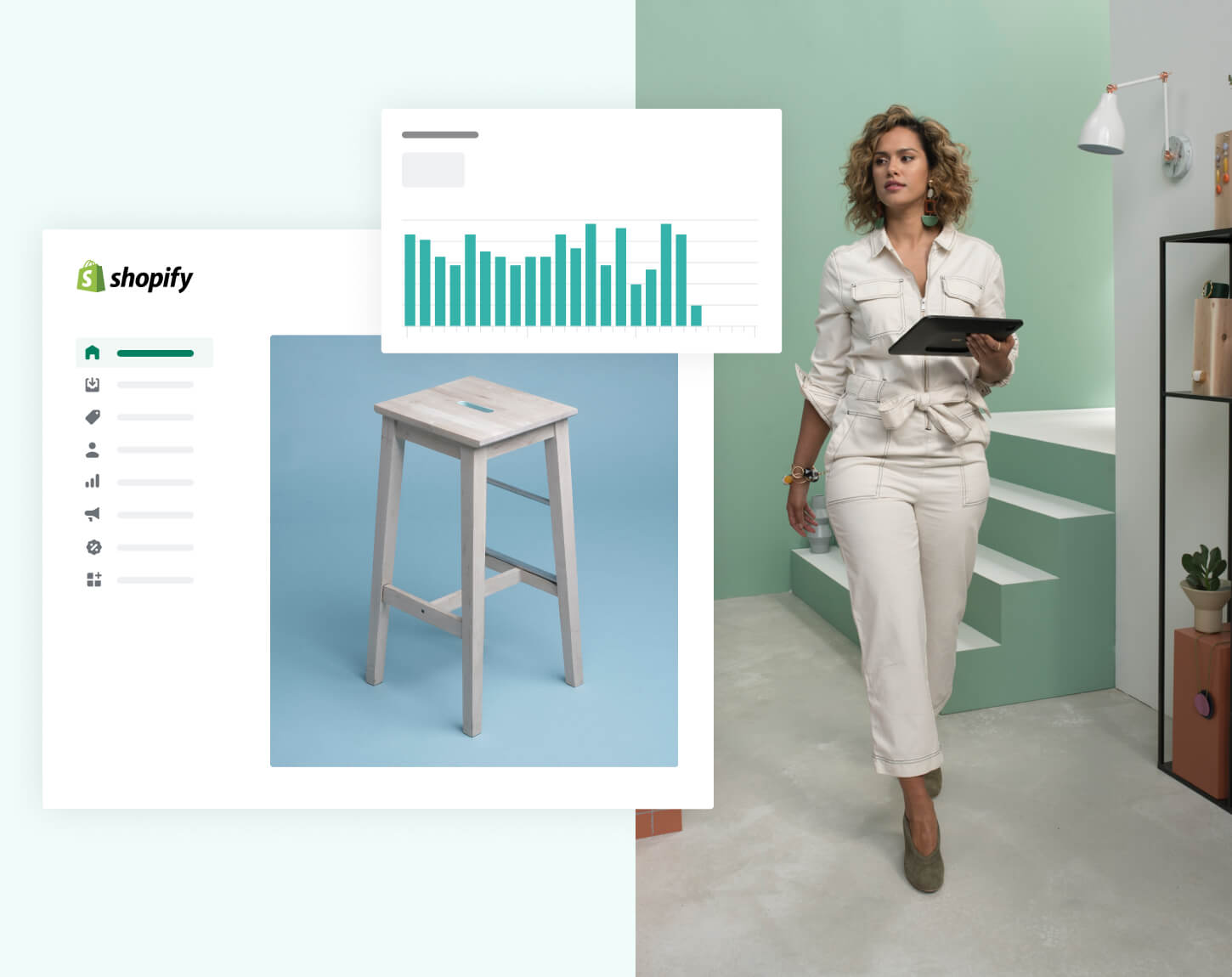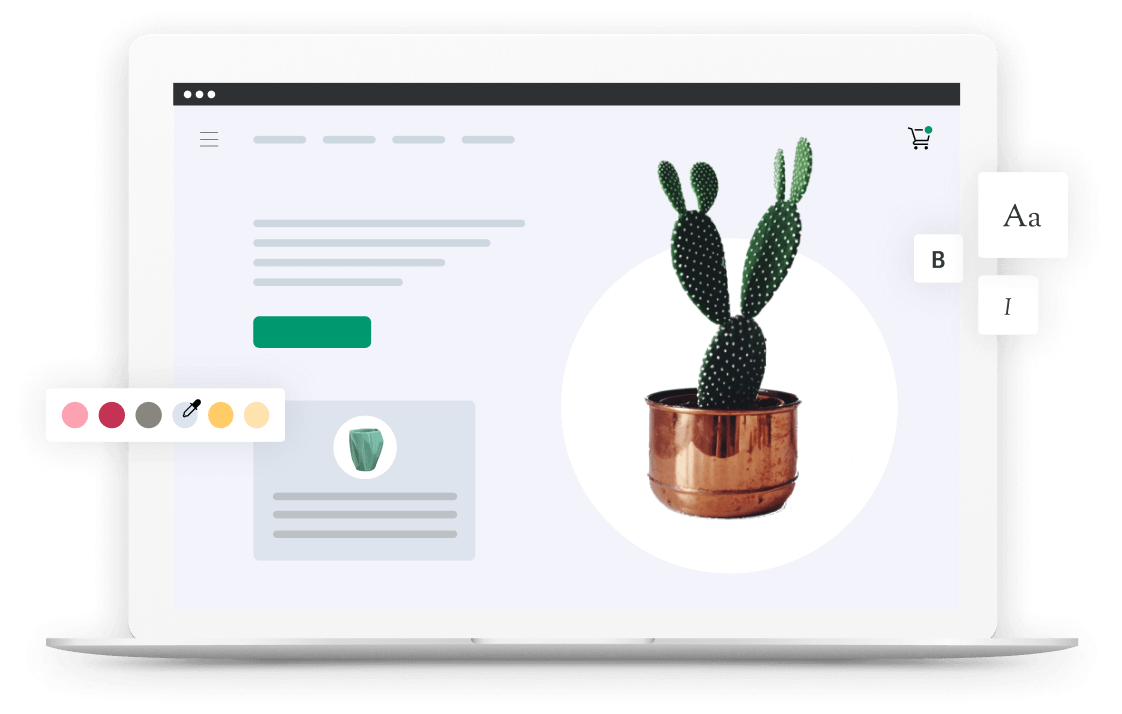Shopify vs Elementor
Shopify or Elementor?
Shopify provides unlimited bandwidth and products so you can grow your business with ease.
You agree to receive Shopify marketing emails.

Why Choose Shopify vs Elementor
| Key features | Elementor | Shopify |
|---|---|---|
| Unlimited bandwidth | Elementor | Shopify |
| Unlimited products | Elementor | Shopify |
| Included subdomain | Elementor | Shopify |
| Domain names for sale | Elementor | Shopify |
| Detailed reporting and analytics | Elementor | Shopify |
| Built-in email marketing | Elementor | Shopify |
| Built-in CMS | Elementor | Shopify |
| Drag and drop capabilities | Elementor | Shopify |
| First-party POS system | Elementor | Shopify |
| Ecommerce specialty | Elementor | Shopify |
| 24/7 customer support | ElementorOnly on Studio plan or higher | Shopify24/7 in English |
| Automatic updates | Elementor | Shopify |
| Hosting included | Elementor | Shopify |
| SSL certificate | Elementor | Shopify |
| First-party fraud detection | Elementor | Shopify |
| PCI compliance | Elementor | Shopify |
| Website themes | Elementor | Shopify |
| Built for ecommerce | Elementor | Shopify |
Start selling with Shopify today
Try Shopify for free, and explore all the tools and services you need to start, run, and grow your business.

9 Things Shopify Can Do vs Elementor
Unlimited bandwidth
Shopify provides unlimited bandwidth to all merchants on all plans. That way, as your website traffic grows, you won’t need to worry about any caps. On Elementor, the bandwidth limit is 50GB. There is also a 25,000 monthly website visits limit.
Custom domain
Using Shopify’s Domain Name Generator you can create your own custom domain name for your online store. Shopify also provides a free subdomain that you can use for as long as you need to under
.myshopify.com. Buying a domain name on Elementor is done through a third-party and a subdomain is not included on the platform.Detailed reporting
When comparing Shopify vs Elementor, you’ll notice a high level of detail in the reporting of your store’s performance. You’ll be able to monitor the performance of sales, returning customer rate, store conversion rate, average order value, best performing products, and so much more. For analytics details on Elementor, you’ll likely want to use Google Analytics or a similar tool since they don’t provide analytics reporting. Shopify also has a Google Analytics integration for you to capture even more analytical data about your business.
Built-in email marketing
When looking at Shopify vs Elementor in terms of email marketing, Shopify has a first-party email feature called Shopify Messaging. On Shopify Messaging, you’ll be able to send up to 2,500 emails to your customers for free each month. Available on all plans, this email tool allows you to craft an email using pre-made designs, send from your own domain, and track your email’s performance. To craft an email on Elementor, you’ll need to add a widget that does this.
First-party CMS
Shopify has a first-party built in content management system (CMS). As a store owner, you can create and run a blog to drive traffic back to your website. You’ll be able to change header tags, add images and image alt tags, include internal or external links, preview the search listing, and more. On Elementor, you’ll need to use a third-party CMS for your blog.
Easy to customize
Shopify is an easy to customize store builder. On the theme editor, you’ll be able to modify images, favicons, colors, typography, and so much more to brand your website your way. On Elementor, you’ll need to customize some aspects in WordPress and others in Elementor which can be challenging if you’re new to the platform.
First-party POS system
When comparing Shopify vs Elementor, Shopify provides a first-party POS system for those who want to take their business offline. You’ll be able to generate sales in person with Shopify POS. The tool integrates with your online stores sales so you can monitor your businesses overall performance. You would need a third-party plug-in to access a POS system for Elementor.
Ecommerce-ready themes
Shopify’s theme store has dozens of ecommerce templates you can use for your online store. Since Shopify specializes in commerce, you’ll find all the features and elements you’d need to run an online store. Elementor ecommerce themes are for WooCommerce instead of a native Elementor feature as the tool doesn’t have an ecommerce feature.
Built-in checkout
Shopify comes with a built-in checkout page that you can customize in Shopify’s Theme Editor. You’ll be able to add a logo and change colors and fonts to match your business’ branding. Shopify takes care of the rest to help you maximize your conversions. On Elementor, there is no checkout page. You’d have to use the Woocommerce checkout page to generate sales using Elementor.
Why Merchants Prefer Shopify to Elementor
24/7 customer support
Shopify support is available 24/7, no matter which plan you’re on. You’ll also have access to help docs, webinars, blog posts, and online courses to guide you along the way. Elementor support includes phone, Help Center, FAQs, video tutorials, and community forums. Pro users receive 24/7 support.
Consistent website look
When you buy a theme on Shopify, you’ll get multiple pages which all share the same consistent look and feel when browsing the pages of your site. On Elementor, it can sometimes be tough to find all the pages you’re looking for since it’s designed to help you find a specific type of page, such as an about us. You may have to do some extra customizations in order to match your Elementor page to have that consistent look.
Included hosting
On every Shopify plan, you’ll have access to hosting. Shopify’s hosting is unlimited and unmetered. Shopify is committed to providing reliable uptime so your website is always available online. On Elementor, you’ll need to join a waitlist for their hosting.
Make edits with ease
On Shopify, editing your store is easy as it’s all available on Shopify. You can customize your theme in the theme editor and store details under Settings. On Elementor, since your website will likely be on WordPress some changes may be done in Elementor while others are done in WordPress, which can be confusing to a new user.
Automatic updates
Shopify automatically launches all updates to all users. That way, bug fixes, layout improvements, and other key changes are done at the same time to ensure your website is secure and your experience is enhanced. You won’t need to manually update your website as you would on Elementor, which is particularly common in WordPress websites.
Built for ecommerce
Shopify’s mission is to make commerce better for everyone. Shopify started as an ecommerce website builder and continues to build the best products to make running an online or brick and mortar business more functional for everyone. Elementor’s key audience is professionals, freelancers, and agencies.
First-party solution
Shopify is a first-party, out of the box solution whereas Elementor is built for WordPress. If terms on WordPress were to change, it could pose a risk for losing your website.
We’ve been able to build something in 3 years that a lot of brands haven’t actually gotten to in 10 years.
Learn More About Shopify

Compare Shopify
See how Shopify compares to other platforms

Shopify Community
Learn from business owners on the Shopify forums

Shopify Help Center
Find answers to all your Shopify questions fast
Start selling with Shopify today
Try Shopify for free, and explore all the tools and services you need to start, run, and grow your business.
FAQs
Which is better for ecommerce: Shopify vs Elementor?
Shopify is built for ecommerce. You’ll find customization features, over 6,000 apps and integrations, and SEO tools that make running an online store or brick and mortar business better. Tools like Shopify POS integrate your online and in-person sales so you can measure your business’ performance with ease.
How to edit Shopify with Elementor
You can install the WP Shopify widget on your Elementor website to edit Shopify with Elementor.
Does Elementor work with Shopify?
You can find a WP Shopify widget on Elementor.
Is Shopify better than Elementor?
Shopify and Elementor serve different purposes and users. Shopify caters to retailers, both online and offline. Shopify is designed to simplify and improve the online shopping experience for business owners. Elementor caters to professionals like freelancers and agencies. Elementor helps you create landing pages for your business.
Page last updated: May 13, 2021
What’s the best commerce platform for you?
Learn why thousands of businesses migrate to Shopify every year.
